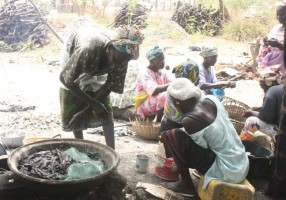About UNDP in The Gambia
As The Gambia formulates its own development solutions, UNDP provides ideas, access to its global knowledge networks and technical expertise to boost capacity development and to promote national efforts to eradicate poverty and attain the Millennium Development Goals.
We seek to do this through alignment of the Country Action Plan (2012- 2016) to the Government's national economic priorities in line with their Programme for Accelarated Growth and Employment (PAGE)
UNDP's focus is on capacity development for pro poor growth and accountability in partnership with Government, the UN system, civil society, and development partners. The ultimate goal is to support the development efforts of the government of the Gambia.
The major thrust of UNDP's support in these areas will be to support The Gambia attain the Millennium Development Goals and reduce overall levels of poverty especially among the most vulnerable and marginalized sectors of the society. UNDPs support will also aim to promote and protect human rights and gender equality ensure good governance and spur the participation and involvement of civil society in promoting these goals.
What do we want to accomplish?
UNDP's focus is on capacity development for Inclusive and pro poor growth as well as accountability in partnership with Government, the UN system, civil society, and development partners. The ultimate goal is to support the development efforts of the government of the Gambia through its Country Program Document and Country Programme Action Plan 2012-2016.
This is a five year framework for mutual cooperation between the government of the Gambia and the UNDP. It takes into account the Gambia’s Long Term Strategy, Vision 2020 and draws upon the Programme for Accelerated Growth and Employment (PAGE). These documents collectively reflect the country’s development priorities and embody national commitment to attainment of the MDGS and the Post-2015 agenda.
UNDP's core areas of focus are:
• Democratic Governance
• Inclusive Growth through Poverty reduction and achieving the MDGs
• Sustainable Energy and The Environment
In furtherance of this, the 2012-2016 CPAP, aligned with the PAGE and the UNDAF and based on promoting inclusive/equitable growth and reducing vulnerabilities will aim to enhance and accelerate support to the Government.
What are our results?
Our key results are expressed in the following outputs
1. Strengthened pro-poor policy, planning and budgeting capacities of national and local level institutions rooted in a human development perspective
2. Strengthened statistical capacities for informing evidence based policy formulation, implementation and monitoring at all levels.
3. Strengthened capacities of governance institutions responsible for accountability, justice and participation at all levels
4. Social protection framework formulated, adopted and implemented in partnership with relevant UN Agencies
5. Access to best practices for civil service reform at national and local levels facilitated
6. Pro-poor, climate-resilient development strategy formulated and adopted for achieving sustainable energy for all
7. Small producers, particularly women, youths and vulnerable groups, access and utilize productive resources and markets through value addition facilities and services
8. Capabilities for skills, access to technology, information and knowledge for women, youth and vulnerable groups enhanced
9. Sustainable use of environmental resources enhanced
Who are the decision makers?
The Resident Coordinator (RC) is the Representative of the Secretary General, Coordinates and works collectively with other UN Heads of Agencies as the UN Country Team (UNCT). The RC is also the UNDP Resident Representative and is supported by a Deputy Resident Representative, a country Economist and National Programme and Operations staff that meet weekly to manage the affairs of the UNDP.
We work in close collaboration with the Government of The Gambia (GoTG) through the Office of The President (Secretary General and the Policy Analysis Unit), the Ministry of Finance and Economic Affairs and the Ministry of Foreign Affairs amongst other key Ministries, Departments and Agencies.
The implementation of UNDP programme activities are carried out by Implementing Partners which includes private sector partners, civil society, donor collaborators and other state and non-state actors.
Current Staff Count for Gambia
| Contract Type | Sub Total |
|---|---|
| Service Contract | 15 |
| UN Volunteers | 6 |
| UNDP Staff | 28 |
| Total | 49 |




